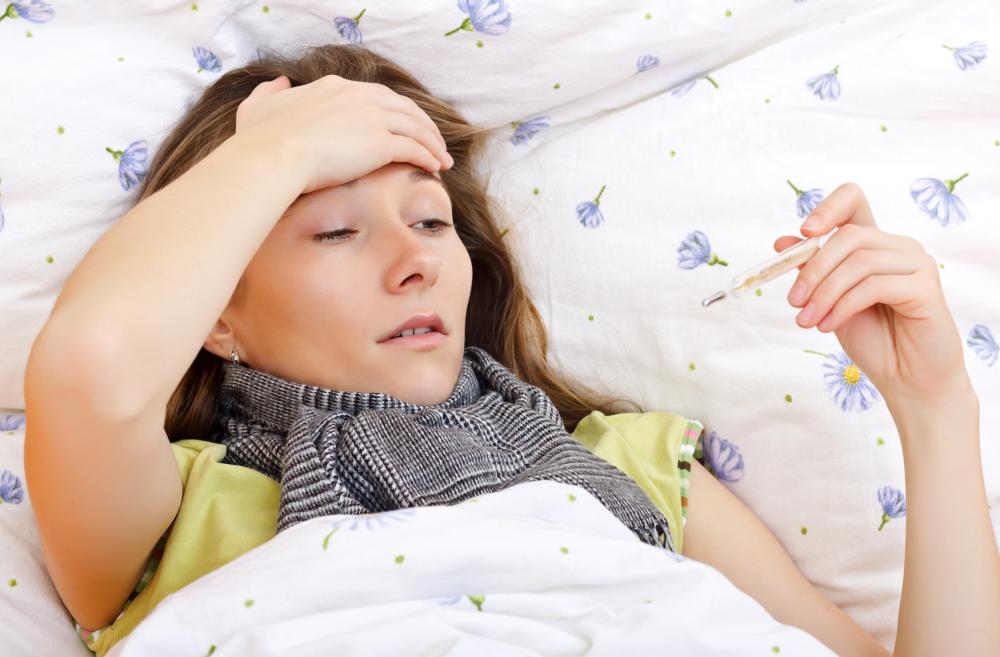At TheHealthBoard, we're committed to delivering accurate, trustworthy information. Our expert-authored content is rigorously fact-checked and sourced from credible authorities. Discover how we uphold the highest standards in providing you with reliable knowledge.
What Causes Hives and Fever?
Hives and fever are usually caused by an illness that develops because of a virus. An individual usually develops a fever because of a virus and hives due to an allergic reaction to the virus. This differs from the reason most people get hives, which is as an allergic reaction to food, medication, or a substance that touches the skin. Fever does not usually develop with such allergic reactions, however. The presence of the fever is often the major indicator that the hives are caused by a virus rather than a typical allergen.
Most people are familiar with hives that develop when a person is exposed to an allergen, but an infection can cause this type of reaction as well. Usually, the infections that cause hives are caused by viruses. In a case of viral hives, the immune system responds to the foreign invader by releasing chemicals, including histamine, which results in swelling, welts or bumps, and itching.

In most cases, there is no need to feel alarmed by the presence of hives and fever. Often, this reaction occurs with just a minor viral illness, especially when children are affected. For example, an illness as minor as a common cold may cause both hives and a fever. If the fever is low-grade and is only marked by minor symptoms in addition to the hives, it is unlikely to be a serious illness. If hives and fever persist for an extended period, however, a person may do well to seek advice from his doctor.

Unfortunately, fever and hives may also develop as a sign of a more serious infection. For example, these symptoms may develop when a person has mononucleosis, the flu, hepatitis or Epstein-Barr virus. An individual may even develop them when he has human immunodeficiency virus (HIV) or acquired immune deficiency syndrome (AIDS).
When a person has hives and fever, he may not need treatment. This depends, however, on the severity of the hives and the severity of a person’s temperature. A person may take an over-the-counter (OTC) antihistamine to treat hives, while fever reducers may prove helpful for lowering a person's body temperature. It is important, however, for a person to ask his doctor whether or not it is safe to take his choice of antihistamines with a fever reducer, as mixing some medications may cause harmful reactions. Alternatively, a person may use a medication that safely includes both an antihistamine and a fever reducer among its ingredients.
AS FEATURED ON:
AS FEATURED ON:

















Discussion Comments
My four year old daughter has been getting hives for the past six months. My husband and I have changed our lives just trying to figure out what it is. Now she has had a fever for two days. Help, anybody. We've had so many visits to the ER.
Leaky gut syndrome can cause these symptoms too. When bacteria enter the body from the gut, it can cause an allergic reaction, as well as an infection which leads to fever.
I have hives and fever right now due to flu. I'm taking pain relievers that are also fever reducers. And I'm taking an anti-histamine for the hives. My hives are almost gone and my fever is reducing as well. So I guess I'm doing fine.
I didn't even see my doctor but I did speak to a nurse over the phone and this is what she suggested. I know that flu causes fever but I was a bit alarmed about the hives. Just like the article mentioned though, the nurse said that this can be seen with flu.
What about when hives and fever are not seen simultaneously but a day apart?
My son had a fever yesterday and today he has no fever, but has developed hives.
Are these two different incidents or can a viral infection cause these symptoms at different times?
Post your comments